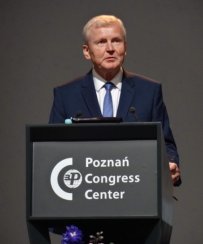Roman Słowiński
Professor and Founding Chair of the Laboratory of Intelligent Decision Support Systems (IDSS) at the Institute of Computing Science, Poznań University of Technology (CS PUT)
 Roman Słowiński is a Professor and Founding Chair of the Laboratory of Intelligent Decision Support Systems at the Institute of Computing Science, Poznań University of Technology, Poland. He is also Professor at the Systems Research Institute of the Polish Academy of Sciences in Warsaw. He is a Full Member of the Polish Academy of Sciences, a society of 330 leading Polish scholars. He has been elected president of the Poznań Branch of the Polish Academy of Sciences for 2011-2018, and chairman of the Committee on Informatics of the Polish Academy of Sciences for the term 2016-2019. Since 2013 he is also a member of Academia Europaea. He is coordinator of the EURO Working Group on Multiple Criteria Decision Aiding, and Past President and Fellow of the International Rough Set Society. In years 2009-2013, he has been an expert of the panel (PE6–Computer Science) of the European Research Council. Since 1999, he is Coordinating Editor of the European Journal of Operational Research, a premier journal in Operational Research.
Roman Słowiński is a Professor and Founding Chair of the Laboratory of Intelligent Decision Support Systems at the Institute of Computing Science, Poznań University of Technology, Poland. He is also Professor at the Systems Research Institute of the Polish Academy of Sciences in Warsaw. He is a Full Member of the Polish Academy of Sciences, a society of 330 leading Polish scholars. He has been elected president of the Poznań Branch of the Polish Academy of Sciences for 2011-2018, and chairman of the Committee on Informatics of the Polish Academy of Sciences for the term 2016-2019. Since 2013 he is also a member of Academia Europaea. He is coordinator of the EURO Working Group on Multiple Criteria Decision Aiding, and Past President and Fellow of the International Rough Set Society. In years 2009-2013, he has been an expert of the panel (PE6–Computer Science) of the European Research Council. Since 1999, he is Coordinating Editor of the European Journal of Operational Research, a premier journal in Operational Research.
He is recipient of the EURO Gold Medal (1991), and Doctor Honoris Causa of Polytechnic Faculty of Mons (2000), University Paris Dauphine (2001) and Technical University of Crete (2008). In 1997 he was given the Edgeworth-Pareto Award by International Society on Multiple Criteria Decision Making, and in 2005 he received the Annual Prize of the Foundation for Polish Science - regarded as the highest scientific honor awarded in Poland. In 2016, he received the Scientific Award of the President of the Polish Academy of Sciences. He is an IEEE Fellow for "contributions to dominance-based rough set theory, robust ordinal regression and preference learning". He has published 14 books and more than 400 articles in major scientific reviews (Web of Science h-index=42, Scopus h-index=52, Google Scholar h-index=80). He supervised 26 Ph.D. theses in Computer Science and many Master theses.
The NEMO framework for Interactive Multiobjective Optimization: Learning value functions from pairwise comparisons
Some years ago, we have proposed the NEMO framework to enhance multiobjective evolutionary algorithms by pairwise preference elicitation during the optimisation, allowing the algorithm to converge more quickly to the most relevant region of the Pareto front. The framework is based on Robust Ordinal Regression. Over the years, several variations have been developed, with different user preference models (linear, additive, Choquet integral value functions) and different ways of integrating this information into evolutionary algorithms (as a surrogate fitness function, or by enriching the dominance relation). This presentation will provide an overview of the developments in this area. Particular attention will be paid to the NEMO-II-Ch method in which, for the first time in the context of evolutionary computation, we apply the Choquet integral as a user’s preference model. It allows to capture interactions between objectives. As there is a trade-off between the flexibility of the value function model and the complexity of learning a faithful model of user’s preferences, in NEMO-II-Ch we propose to start the interactive process with a simple linear model, but then switch to the Choquet integral, as soon as the preference information can no longer be represented using the linear model. An experimental analysis demonstrates effectiveness of this approach.
Luis Dias
Associate Professor at the Faculty of Economics, University of Coimbra (FEUC)
 Luis C. Dias obtained a degree in Informatics, a Ph.D. in Management, and Habilitation in Decision Aiding Science from the University of Coimbra. He is an Associate Professor at the Faculty of Economics, University of Coimbra (FEUC), where he has been teaching courses on decision analysis, operations research, informatics, and related areas. He held temporary invited positions at the University Paris-Dauphine and the University of Vienna. He is currently the FEUC Vice-Dean for Research, the Director of the Centre for Business and Economics Research at U. Coimbra (CeBER), a collaborator at INESC Coimbra, a member of the coordination board of U. Coimbra’s Energy for Sustainability Initiative, and a Vice-President the Portuguese Operational Research Society.
Luis C. Dias obtained a degree in Informatics, a Ph.D. in Management, and Habilitation in Decision Aiding Science from the University of Coimbra. He is an Associate Professor at the Faculty of Economics, University of Coimbra (FEUC), where he has been teaching courses on decision analysis, operations research, informatics, and related areas. He held temporary invited positions at the University Paris-Dauphine and the University of Vienna. He is currently the FEUC Vice-Dean for Research, the Director of the Centre for Business and Economics Research at U. Coimbra (CeBER), a collaborator at INESC Coimbra, a member of the coordination board of U. Coimbra’s Energy for Sustainability Initiative, and a Vice-President the Portuguese Operational Research Society.
Luis’s research interests include multicriteria decision aiding, performance assessment, group decision and negotiation support, decision support systems, and applications in the areas of energy and environment. His publications include over 60 articles in peer-reviewed international journals and he has coedited several journal special issues and books. He is on the Editorial Board of the EURO Journal on Decision Processes and Omega.
From Multiple Criteria Decision Aid to Preference Learning in Location Suitability Assessment
When a firm (or another entity) wishes to select a geographical location for one or several new facilities, it needs to assess a potentially very large number of alternatives. A location suitability assessment can be used to filter the most promising alternatives or even to recommend the most suitable one. This is naturally a multi-criteria assessment problem, since economic, environmental, social and technical concerns are at stake. This talk will present a few examples of location suitability assessment that followed different strategies for eliciting preferences, having in common the ELECTRE TRI multi-criteria sorting method as the underlying base model. We will then discuss how to combine such approaches with data analytics tools, aiming at offering decision aiding tools able to adjust to the information that is made available.
Andrea Passerini
Associate Professor at the Department of Information Engineering and Computer Science, University of Trento (DISI) and Adjunt Professor at Aalborg University
 Andrea Passerini is Associate Professor at the Department of Information Engineering and Computer Science (DISI) of the University of Trento, and Adjunt Professor at Aalborg University. He is director of the Structured Machine Learning Group and coordinator of the Research Program on Deep and Structured Machine Learning, both at DISI. His research interests include structured machine learning, statistical relational learning, learning and optimization, preference elicitation and bioinformatics.
Andrea Passerini is Associate Professor at the Department of Information Engineering and Computer Science (DISI) of the University of Trento, and Adjunt Professor at Aalborg University. He is director of the Structured Machine Learning Group and coordinator of the Research Program on Deep and Structured Machine Learning, both at DISI. His research interests include structured machine learning, statistical relational learning, learning and optimization, preference elicitation and bioinformatics.
Constructive Preference Elicitation
Constructive recommendation is the task of learning to recommend “configurations”, i.e. objects that can be assembled from their components on the basis of the user preferences. Examples include PC configurations, recipes, travel plans, layouts, and other structured objects. We cast this problem as a structured prediction task, in which the recommended objects are created by maximizing a learned utility function over an exponentially large combinatorial space of possible configurations. The utility function is learned through preference elicitation, a process in which the user interacts with and provides feedback to the system with the final goal of obtaining an optimal recommendation. Constructive preference elicitation systems can help users make good decisions over complex configuration spaces. In this talk I will discuss the research problems involved in devising constructive preference elicitation systems and present several algorithmic solutions.
Ori Davidov
Faculty Member at the Department of Statistics, University of Haifa
 Ori Davidov is a Professor of Statistics at the University of Haifa where he has been on the faculty since October 1999. He received his doctorate in Biostatistics from Harvard University in 1996 under the supervision of Marvin Zelen. He also hold a M.S. degree in Statistics from Carnegie Mellon University (1992) and prior to that he had been a medical student at Hadassah Medical School, the Hebrew University.
Ori Davidov is a Professor of Statistics at the University of Haifa where he has been on the faculty since October 1999. He received his doctorate in Biostatistics from Harvard University in 1996 under the supervision of Marvin Zelen. He also hold a M.S. degree in Statistics from Carnegie Mellon University (1992) and prior to that he had been a medical student at Hadassah Medical School, the Hebrew University.
After his doctorate he was a visiting scholar at the University of Washington and a postdoc at Seattle’s Fred Hutchinson Cancer Center followed by a short stint at Merck Research Laboratories in Rahway NJ.
His research has been supported by the U.S-Israeli Bi-National Science Foundation (BSF), the Israeli Science Foundation (ISF), and the National Institutes of Health (NIH). He has held visiting positions at Merck Research Labs, Harvard University and the National Institute of Environmental Health Sciences (NIEHS). He is an elected fellow of the International Statistical Institute.
Graphical linear models for paired comparisons data.
Graph based least square procedures for rank data are analyzed from a statistical perspective. Finite sample properties as well as asymptotic distribution theory for finite and infinite graphs is developed. Goodness of fit tests for detecting local and global lack of fit are proposed. The methodology is explored by simulation. A real data example is analyzed.
Wojciech Kotłowski
Associate Professor at the Institute of Computing Science, Poznan University of Technology (CS PUT)
 Wojciech Kotłowski is an assistant professor at Poznan University of Technology, Poland. From 2009 to 2012, he was a post-doctoral researcher in Centrum Wiskunde & Informatica (Amsterdam, Netherlands) in the group of Peter Grünwald.
He obtained his Ph.D. degree in Computer Science from Poznan University of Technology in 2009 under supervision of Roman Słowiński. His main research interests are in the theory of machine learning, particularly in the online learning with adversarial data.
Wojciech Kotłowski is an assistant professor at Poznan University of Technology, Poland. From 2009 to 2012, he was a post-doctoral researcher in Centrum Wiskunde & Informatica (Amsterdam, Netherlands) in the group of Peter Grünwald.
He obtained his Ph.D. degree in Computer Science from Poznan University of Technology in 2009 under supervision of Roman Słowiński. His main research interests are in the theory of machine learning, particularly in the online learning with adversarial data.
Online learning of isotonic functions
We revisit the problem of fitting monotonic functions to best explain the data, in an online setting. We first show that without assumptions on the data generating mechanism (that is, in a fully adversarial model) the problem is unlearnable and every learning algorithm fails. We thus consider two distinct setups in which the problem is trackable and look for efficient, provably low regret algorithms. The first setup is the "fixed design" model, in which all the inputs are given in advance to the learner. The second setup is the random permutation model in which the adversary can choose the data, but the instances are revealed to the learner in a random order. We provide the optimal algorithm for both models, which is the Exponential Weights algorithm played over a covering net of isotonic functions. We also analyze the class of simple and popular forward algorithms which, contrary to Exponential Weights, can be easily extended to partial orders.